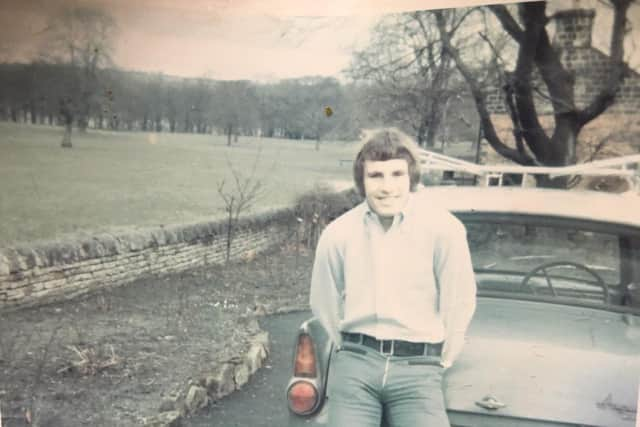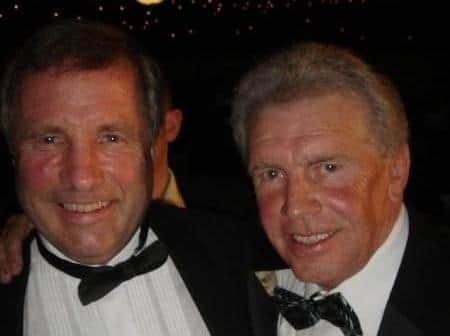Drinks with Leeds United behind the Iron Curtain and Stasi permission to watch the Revie Boys
and live on Freeview channel 276
But even as Nigel Chambers, a young interpreter and translator working in Leipzig, booked a day’s leave to travel to Dresden and watch his beloved football club, he wouldn’t dare to dream of the special memories Don Revie and the team would generously grant him.
Chambers followed Leeds from the 1950s, when his brother introduced him to matchdays at Elland Road.
Advertisement
Hide AdAdvertisement
Hide AdHis Russian and German studies at the School of Modern Languages at Leeds University first took him to East Germany, officially the German Democratic Republic [GDR] for a semester at Leipzig’s Karl Marx-Universität – Angela Merkel’s alma mater – early in 1970.
He returned to the city in September and took up a post with Intertext, the East German state translating and interpreting bureau, editing technical documents and interpreting at Leipzig International Trade Fairs – but never for British firms.
“The country was not recognised as a legal regime in the West until 1973 – there was no consular representation in East Berlin,” he said. “If you fell foul of the Stasi [The Ministry for State Security, you were up the creek without a paddle. After over a generation in isolation from the West, command of the English language was at a very low level in the GDR.
“The only foreign language compulsory in schools was, of course, Russian. I was therefore a big asset to Intertext as a native English speaker, one of only two in the service.
Advertisement
Hide AdAdvertisement
Hide Ad“Unfortunately, this status did not confer on me any rights as far as interpreting jobs were concerned. Being branded politically unsound, I was barred from assignments to work for British companies, since I did not share the ‘Land of unlimited Opportunities’ vision.


“During Fairs, I was instead hired by the Marubeni Corporation of Japan.”
Two months after he settled back into Leipzig life, Chambers was thrilled to discover Leeds were to play in Dresden, 120km away. He had to be there.
Armed with a UK passport – ‘virtually unheard of in the GDR in those days’ – and a bold spirit, he set about finding his heroes at Rudolf Harbig Stadion.
Advertisement
Hide AdAdvertisement
Hide Ad“Asking to be appointed official interpreter was clearly futile, so I decided to take a day’s leave and travel to the game privately,” he said.


“Arriving at Dresden station in the morning, I knew it was a short walk to the stadium.
“It was surprisingly easy to blag my way inside, having momentarily forgotten that I speak fluent German.
“I asked politely where the Leeds team was. The first people I met were Les Cocker and Don Revie, who was amazed to see a Leeds lad appearing in such an improbable venue.”
Advertisement
Hide AdAdvertisement
Hide AdAnd so began a brief but memorable relationship between the Leeds fan and the men he idolised, men who, much to his disbelief, welcomed him into their travelling party.
“Once I’d explained how I came to be in Dresden, Don became most solicitous of my welfare, and promptly ensured that I was given a ticket for the evening game,” said Chambers.
“By then, I’d miraculously remembered my German and, in return, intervened with the Dynamo officials to obtain, for the team, access to the pitch for pre-match training at a time of their choice.”
Leeds had beaten their hosts 1-0 at Elland Road in the first leg of the second-round tie and, although they could not give Chambers a victory to cheer, progressed on away goals following a 2-1 defeat.
“The game itself was very close,” he recalled.
Advertisement
Hide AdAdvertisement
Hide Ad“Dynamo was a well-organised if unspectacular team which went on to dominate East German football for the next decade, marred only by a few key players defecting to the West during away games.
“I seem to recall their first goal was down to one of Gary Sprake’s ‘careless hands’ moments, so it was a huge relief when Mick Jones scored. It was an utterly surreal experience, in a stand packed with Germans, a lone voice hollering and frantically waving my white, yellow and blue scarf.”
Leeds’ hospitality extended to a ride to the hotel on the team coach and a post-match drink.
“I stayed for a drink with the players before leaving to find my bed at the Technische Universität Dresden,” he said.
Advertisement
Hide AdAdvertisement
Hide Ad“I recall them being equally baffled by what a Leeds lad could possibly be doing in Dresden. One of them, I think it was Norman [Hunter], started referring to me in fun as Professor.”
As his head hit the pillow after a dream of a day, Chambers had no inkling at all that he would repeat the experience a month later in Prague.
“It is equally bizarre how I found out that Leeds had been drawn against Sparta Prague in the next round,” he said.
“In my stay of over a year in the GDR, it would never have entered my head to attempt a phone call to another country – this would have involved queuing for hours at the post office and giving the Stasi the chance to bug the call – I occasionally wrote to family and friends, but letters to the West were likewise systematically read by the Stasi, and any with seditious content doubtless destroyed. In fact, I had a work colleague to thank for finding out about the fixture.
Advertisement
Hide AdAdvertisement
Hide Ad“He was a fellow football supporter, a fan of Lokomotiv Leipzig, who had seen the draw for the third round in the sporting press.
“This was such a fluke.”
The head of Chambers’ department at Intertext was also a football fan, a Chemie Leipzig supporter, and a Stasi member to boot. He signed off on another day of leave and Chambers was off to see the Whites again.
After an all-day rail journey, complete with painstaking East German border guard searches, he arrived in Prague and, at his third port of call, located Leeds engaged in a Revie briefing at the Hotel Ambassador.
“Having fully expected to be told politely to clear off, I was absolutely dumbfounded at being offered a seat and a cup of coffee, and asked to sit through it,” said Chambers.
Advertisement
Hide AdAdvertisement
Hide Ad“Some of the players and coaching staff remembered me from Dresden. All of them were extremely welcoming, and I became the butt of some good-natured banter”
He travelled to the Letna Stadium on the team coach and joined 30,000 Czechs to watch Leeds, who won 6-0 a week prior in the first leg, triumph again, this time 3-2 with goals from Eddie Gray, Allan Clarke and Rod Belfitt.
It is not the football the 71-year-old recalls most fondly.
Now living in Rutland, the grandfather of two remains as passionate about the Whites as he did in his early 20s [“I shall staunchly follow both Leeds United and Leeds Rhinos as long as I draw breath”]. And it is clear he is just as in awe of the great manager who gave him two unforgettable experiences as he was when they were unfolding.
“My abiding memory of this incredible experience is the extraordinary generosity of Don Revie,” he said.“When I thanked him profusely for showing such kindness towards me, he modestly retorted that ‘do as you would be done by’ is one of his guiding principles in life.
“I’ve tried to follow his example by treating others as I’d wish to be treated myself in my own life.”